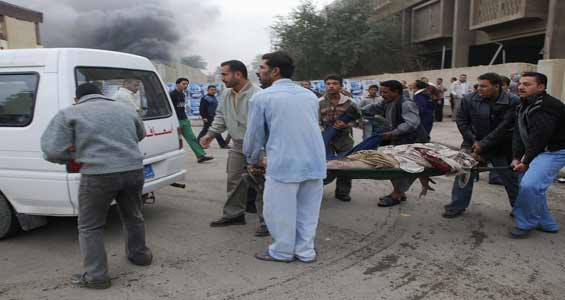A string of bombings which struck key government sites in the capital, Baghdad, killed and injured hundreds of people.
The death toll of at least 127 accounted for more dead in a single day than the number or those killed throughout the month of November.
But the co-ordinated attacks also cast doubts on the government’s ability to maintain security using the country’s national forces ahead of pivotal elections scheduled for March 7, 2010.
Al Jazeera’s Ahmed Janabi interviewed Wafiq al-Samaraei, a former intelligence chief under the Saddam Hussein government, and more recently the former security advisor to Jalal al-Talabani, the current Iraqi president.
Al-Samaraei currently resides in London where he is an intelligence and security analyst.
Al Jazeera: The bombings on December 8 mark the third major set of attacks to hit the capital, Baghdad, since August. Why have the attack tactics changed to become fewer in number but greater in terms of the level of death and destruction?
Wafiq al-Samaraei: After the US implemented their security plan which involved setting up and supporting the emergence of the Awakening Councils (Sunni tribal militias) in 2006, many anti-government and anti-US armed groups found that they had lost the friendly environment that allowed them to freely operate after the US-led invasion in 2003.
Iraqi security forces increased in number and deployed to almost every part of Iraq.
Obviously, these armed groups can no longer stage face-to-face battles with heavily-equipped government forces. As a result, they began to modify their tactics to rely on intelligence-gathering operations.
Before 2006, the average number of attacks was 200 daily, only 10 of which were successful. Now, the average has dropped to 20 attacks a day but some 50 per cent are successful.
What can the Iraqi government do to avoid such a large number of casualties?
Iraq now is full of security forces, but lacks a sophisticated and effective intelligence department and the attackers know that very well. That is why they started to carry out attacks that cannot be foiled by police and security forces.
The government committed several fatal mistakes, the first being that it dismissed experienced intelligence officers because they worked under Saddam.
This has ultimately weakened the country’s security situation because incompetent and inexperienced people now run the intelligence department in the defence ministry.
The second mistake was that in a bid to force his party’s command of security forces, Nouri al-Maliki, the prime minister, (who lacks military experience), has been intervening in how security forces conduct their operations. This complicates their tasks and makes them lose their focus.
The third mistake is that there are nine security departments and each is controlled by different political blocs and work for different agendas.
How are the attackers able to bypass the huge number of checkpoints in Baghdad and carry out such devastating attacks?
Al-Maliki leads a small faction inside the Daawa Party, while the security forces are loyal to many other factions. This effectively means that al-Maliki does not have loyal security forces.
When security forces do not believe in the political agenda of their government, you end up with disloyal forces that perform sloppy security work, which could include accepting bribes to look the other way.
On the other hand, the attackers seem to have good intelligence. I am saying that because they managed to carry out simultaneous attacks in different areas in Baghdad. They were able to locate the secret headquarters of the ministry of finance. It also means they have good planning and manpower.
Again, I would urge Iraqis to work together to establish an efficient intelligence force; it is the only solution to prevent such tragic attacks on innocent people.
The government has accused the deposed Baath party and al-Qaeda of being behind the recent string of attacks. Other quarters point at US military involvement and Iranian operatives. Some have even gone so far as to say the government itself has been orchestrating the attacks. What are we to believe?
Whenever there is an attack, the al-Maliki government tends to use already prepared accusations to point the finger of blame at the Baath Party or neighbouring countries.
Such quick accusations that are not based on evidence and proper intelligence work would confuse everyone, and give anti-government forces an opportunity to suspect that the security forces themselves are involved.
Ultimately, accusations that are not based on forensic hard evidence end up harming security forces and eating away at their credibility.











